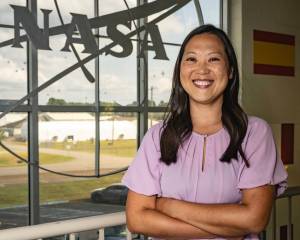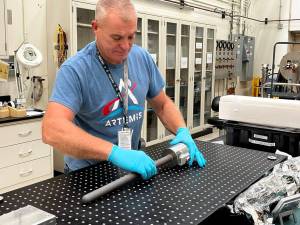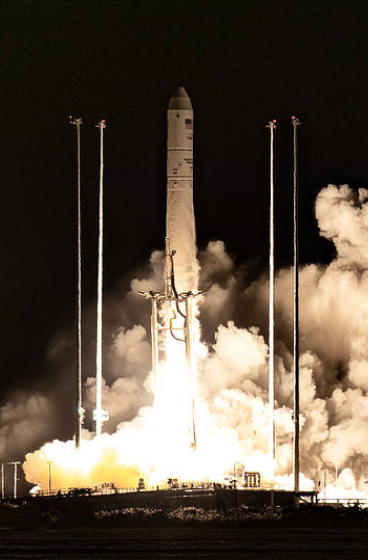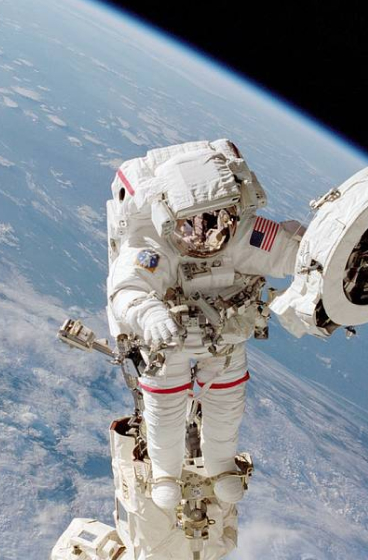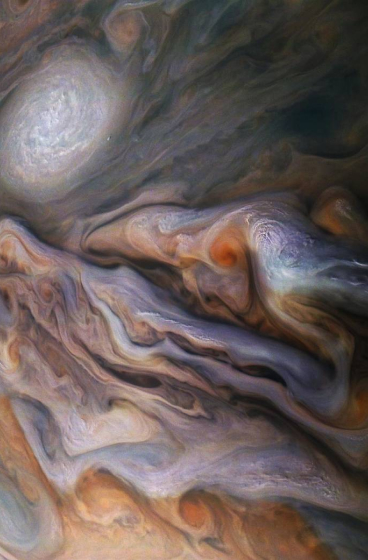5 min read
Take 5 with Brad Zavodsky
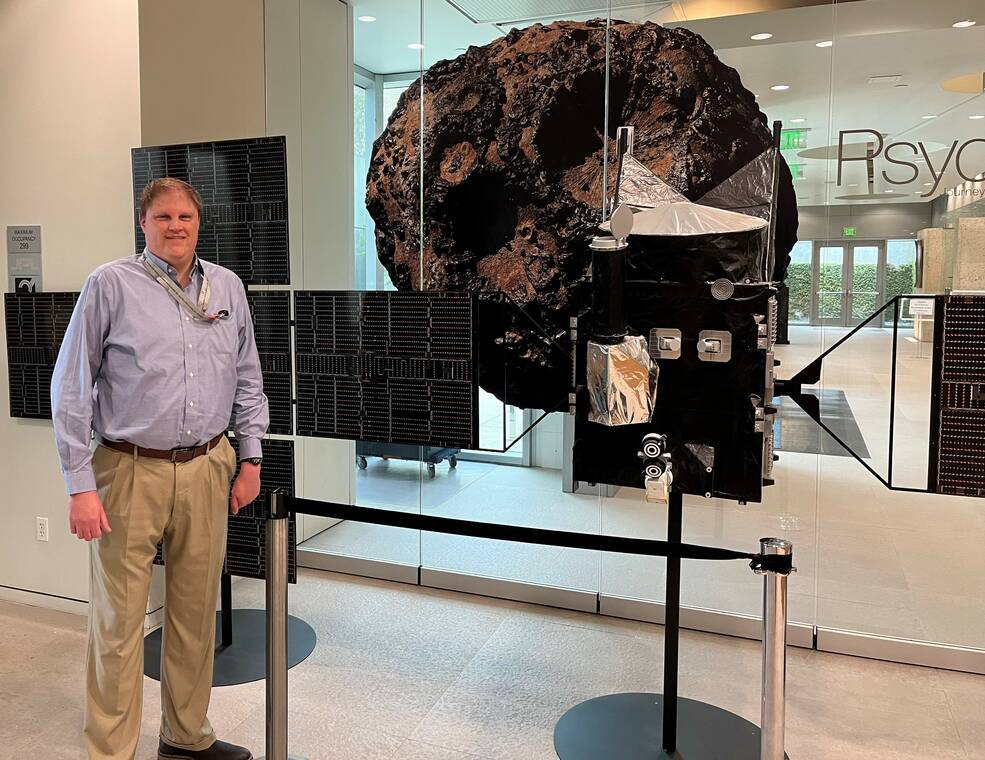
By Wayne Smith
Brad Zavodsky’s interest in science piqued at a young age. Growing up in Cincinnati, Ohio, both of his parents were teachers and they instilled in him a sense of curiosity about the world.
“My dad was a middle school science teacher and he was great at communicating science and helping others understand how the world works,” said Zavodsky, the mission manager of NASA’s Psyche asteroid mission for the Planetary Missions Program Office at Marshall Space Flight Center. “I like to say that working in the program office takes me back to being a student, staring in wonder at pictures of the planets in textbooks. Now, I get to work on projects that are re-writing those same books! I really enjoy sharing the planetary missions’ scientific discoveries with my family and giving back to those who first cultivated my scientific interest.”
The Psyche mission – a journey to a unique metal-rich asteroid orbiting the Sun between Mars and Jupiter – is scheduled to launch Oct. 5 on a Falcon Heavy from NASA’s Kennedy Space Center. What makes the asteroid Psyche unique is that it appears to be the exposed nickel-iron core of an early planet, one of the building blocks of our solar system. Psyche is part of NASA’s Discovery Program, also managed by Marshall.
Zavodsky’s sense of curiosity continues to drive him. He is also motivated and shares the enthusiasm of PIs (principal investigators) and science teams in the Planetary Missions program.
“Our PIs are extraordinary leaders in their scientific disciplines and have worked their whole careers to get to the point where they are leading a mission for NASA,” Zavodsky said. “It is exciting to be able to help them achieve their goals and objectives.”
Just being a small part of the revolutionary science data that our projects collect pushes me to do my best every day.
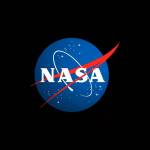
Brad Zavodsky
Mission manager of NASA’s Psyche
Question: What are your primary responsibilities as program manager for the Psyche mission?
Zavodsky: I am responsible for ensuring the project has the resources necessary to successfully accomplish the mission. I am also responsible for overseeing the technical, cost, and schedule aspects of the project and ensuring that stakeholders within NASA are informed about any risks in those areas. The goal is to enhance the probability of mission success through providing this oversight. Additionally, I help the project navigate NASA processes and procedures, specifically the NASA Space Flight Program and project management requirements to confirm that they are compliant with all the necessary requirements to prepare them for gate reviews and decisional meetings.
Question: What excites you most about the future of human space exploration and your team’s role in it?
Zavodsky: The planetary bodies we target are unique, and many times, the first time humans have visited a location in our solar system. Psyche is humanity’s first visit to a metal asteroid. We have visited rocky bodies like Mercury and asteroids, icy bodies like comets, and gas bodies like Jupiter and Saturn, but this will be the first time we have visited a metal body. One of Psyche’s objectives is to identify whether the Psyche asteroid is a remnant planet core like Earth’s core, which could teach us about the early history of our own planet. Some of our other projects are targeting Jupiter’s moon, Europa, and Saturn’s moon, Titan, to identify environments that may sustain or once may have sustained life. It is exciting to have a front row seat for these types of exploration projects that are helping to solve some of humanity’s longest-standing questions about the universe.
Question: What has been the proudest moment of your career and why?
Zavodsky: I had the opportunity to support the acquisition process for the 2019 Discovery Program Announcement of Opportunity. I assisted the program scientist in preparing the panels that reviewed the various mission concepts, managing the review process, and communicating the results of the review to decision makers at NASA Headquarters. Being in that role allowed me to participate in several decisional meetings at headquarters, which provided incredible insight into how NASA selects missions and the types of programmatic considerations that are required when making such decisions. This Announcement of Opportunity ultimately led to the selection of the DAVINCI (Deep Atmosphere Venus Investigation of Noble gases, Chemistry, and Imaging) and VERITAS (Venus Emissivity, Radio Science, InSAR, Topography, and Spectroscopy) missions to Venus, the first NASA missions to our neighbor planet in over three decades. When those missions were announced by the NASA administrator, I was extremely proud to have played a role in the process.
Question: What advice do you have for employees early in their NASA career or those in new leadership roles?
Zavodsky: When presented with new work or training opportunities, say yes. Trust that your supervisor is putting you in a position to learn a valuable skill and setting you up to succeed. If you are not getting those opportunities, communicate to your supervisor about your willingness to learn new skills or try a new role. Taking stretch assignments or accepting a new role can be intimidating, but every job requires some on-the-job training, so you can never expect to be an expert on day one. While you may not feel like you have all the experience needed, if you identify others who have experience, establish good relationships, and ask lots of good questions, you can accomplish anything.
Question: What do you enjoy doing with your time while away from work?
Zavodsky: I enjoy watching sports during my time away from work. Having grown up in Cincinnati, I am a lifelong Cincinnati Reds, Cincinnati Bengals, and University of Cincinnati Bearcats basketball fan. Since moving to Huntsville in 2005, I have also become a big University of Alabama football fan.”
Smith, a Media Fusion employee and the Marshall Star editor, supports the Marshall Office of Communications.
Share
Details
Related Terms
Click here for original story, Take 5 with Brad Zavodsky
Source: NASA Breaking News
